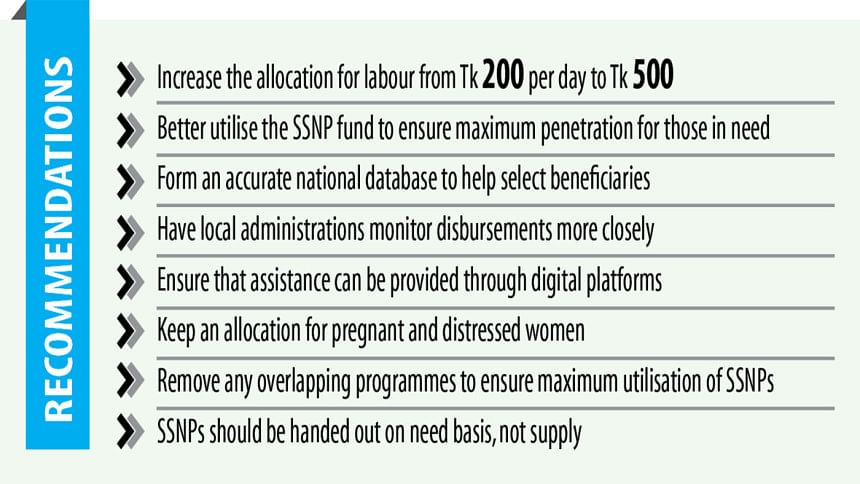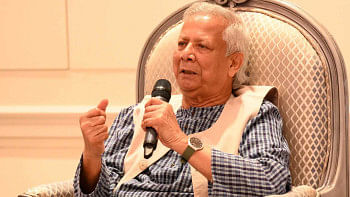Most safety net benefits go to ineligible households: CPD

Around 65.6 per cent of the country's households that receive financial assistance under the government's social safety net programme (SSNP) are ineligible for the scheme as they belong to the non-poor category, according to the Centre for Policy Dialogue (CPD).
As per a recent CPD study on the efficiency of delivery mechanism of five leading SSNPs in Bangladesh, it was found that most beneficiaries were selected through political consideration and nepotism.
The five SSNPs were maternity allowance for poor mothers, primary school stipend programme (PESP), secondary school stipend programme (SESP), employment generation programme for the poorest (EGPP) and old age allowance.
The study's findings were disclosed during a virtual dialogue on the 'Efficiency of delivering social protection programmes in north-west region', organised by the CPD in association with European Union and Oxfam Bangladesh yesterday.
The dialogue was conducted by Mustafizur Rahman, distinguished fellow of the CPD, while Towfiqul Islam Khan, a senior research fellow, made a presentation on their findings.
Carried out in Rangpur division, the study covers four disadvantaged districts, namely Gaibandha, Kurigram, Nilphamari and Rangpur.
According to Khan, among the five SSNPs covered under the study, EGPP had the best targeting while SESP had the worst.
The increase in fund allocations for SSNPs failed to match the pace of the overall rise in budgetary allocation or GDP, CPD data shows.
As a part of its study, the CPD interviewed officials from the local administration and other representatives from NGOs and the civil society.
For the quantitative part of the survey, 1,500 households which had at least one SSNP beneficiary were surveyed using a semi-structured questionnaire.
It was then found that almost a third of the total SSNP budget is used to pay the pensions of retired government officials and their families.
This makes the actual resource envelope even smaller than it appears, the CPD said in its findings, adding that in the absence of a proper information dissemination campaign, potential beneficiaries are decided by middlemen.
Beneficiaries who maintain a good relationship with their respective UP chairmen and other administrative members, including secretaries, are always the first to know about maternity or old age allowance cards.
Although school authorities were asked to prepare a new list featuring 30 per cent of the poor female students and 20 per cent of the poor male students from each class every year, the field study showed that school authorities often neglect the SESP policy guidelines.
Authorities select the beneficiaries for the SESP once they reach class six but do not repeat the process each year as required.
In other words, the lists never include new students who get admitted in upper classes, but on the other hand, the authorities never fail to exclude students from the programme if they fail an examination or get married.
Similarly, even though the EGPP policy stipulates that beneficiaries selected in the previous year cannot be changed the next year, in certain districts locally elected representatives assume that once finalised, the beneficiary list cannot be altered.
This results in the misuse of such funds as beneficiaries who have completed their graduation continue to receive benefits under the programme.
According to statements from a number of UP chairmen, members and government officials, most targeting errors arise in the case of maternity allowance and old age allowance distributions as cards are given away on political consideration.
While addressing the dialogue, AB Tajul Islam, MP and chairman of the parliamentary standing committee on the Ministry of Disaster Management and Relief, alleged that certain government initiative pushes its officials to conduct irregularities since the directives do not match the situation in reality.
According to him, there is a Tk 200 per day allocation for a labour, which is insignificant when considering the size of the sector in Bangladesh.
For this reason, it is not possible to manage workers with this low wage and the allocation eventually goes to another account with a fake name, Islam said, adding that the budget should be increased to Tk 500 per day as it would help address the issue.
He also hoped that the CPD's findings will prove helpful for policy makers when raising the issue before the government.
Debapriya Bhattacharya, a distinguished fellow of the CPD and of Convenor the Citizen's Platform for SDGs, said the government and its development partners are now quite alert towards the poor community's needs.
The government has been undertaking big programmes to address the hardships faced by the poor in Bangladesh and most field level officials work with utmost sincerity in this regard.
The government allocates around 2 per cent of the country's GDP for SSNPs but the size of this fund is insufficient to cover the people's needs, especially after pension disbursements for former government officials is deducted, he added.
Bhattacharya went on to emphasise on the need to develop an accurate database to build up institutional efficiency for SSNP distributions.
He also said local administrations should play a more proactive role in informing the people of their rights while suggesting that the scope to provide assistance through digital platforms should be added.
An allowance for pregnant women and women in distress should be added to the SSNP, said Parveen Akhter, director general for the department of women affairs that works for pregnant women and VGD programme.
Meanwhile, Fahmida Khatun, executive director of CPD, stressed on the need to prioritise the poorest of the poor in the list of beneficiaries.
According to the CPD executive director, the organisation tries to provide maximum benefits right to the door step of SSNP beneficiaries.
These social assistance programmes play a key role in alleviating poverty in Bangladesh, however, there are some overlaps in the programme which should be removed, said Dipankar Datta, country director for Oxfam Bangladesh.
Rensje Teerink, ambassador and head of the EU delegation to Bangladesh, said the SSNP is helping poor people to improve their quality of life.
She suggested that the programme should be conducted efficiently and effectively for maximum output.
Teerink also recommended for building up institutional capacity to conduct the SSNP.
Prof M Abu Eusuf, chairman of department of development studies at University of Dhaka, said it will be helpful for policymakers to undertake such initiatives in the future.
Some people get assistance from the SSNP despite being ineligible while those who do qualify are neglected, but now the government has undertaken a number of initiatives to resolve the issue.
Only 5 per cent of the total old age allowance beneficiaries are located in urban areas, he added.

 For all latest news, follow The Daily Star's Google News channel.
For all latest news, follow The Daily Star's Google News channel. 



Comments